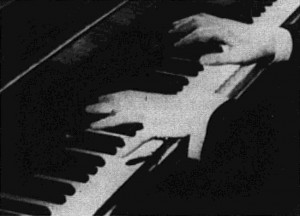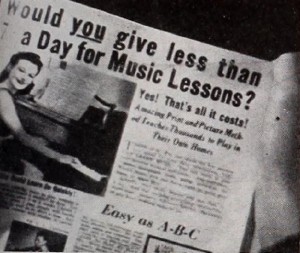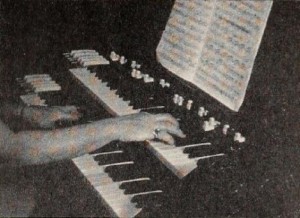short film
"Il film descrive le sensazioni che la musica popolare di un “pianino” girovago produce in determinati individui che si trovano in altrettante determinate situazioni"
"The film portrays the feelings that the popular music of a wandering “little piano” produces in particular individuals in similarly particular situations."
—Notizario delle sezioni cinematografiche dei gruppi universitari fascisti a cura del ministero della cultura popolare, September 1938 p. 9

"This is a short story about a musician, a pianist who has enjoyed the pleasure and popularity of concerts in many cities of Europe. And then came the war! Even in the thick of battle, when his fingers must play a different keyboard, music does not leave his mind. The picture closes with the last concert, simple, but forceful in its emotional impact" PSA Journal, Nov. 1959, 48.

"An edited home movie by Arthur H. Smith of Smith's later years, living with his wife Blanche in Big Bear Lake, California, including a description of his filmmaking process." Archive.org

"Lend Me Your Ear is an almost perfect synthesis of shrewd planning, impeccable camera work, smoothly integrated music and general, overall charm. It is gay, glamorous and in good taste. In it, Erma Niedermeyer has caught the lighthearted spirit of 'teen aged American youth. That she was amply aided by her own attractive son was her further good fortune. As the film opens, the Boy is discovered musing over that classic advertisement which guarantees to teach you piano in ten easy lessons. "You too can be the life of the party!" it clarions. The Boy answers the call, the lessons start arriving and the fun begins. There is the light "running gag" of the harried postman, continually overwhelmed by the Boy's enthusiasm as he delivers each new installment; there is the time the piano refuses to play, clogged up as it is by a basketball in its "innards"; there is the tousle headed imitation of Franz Liszt at the age of fourteen — and more. There is, in climax, the Boy's devastating triumph amid a bevy of admiring beauties, as he becomes in truth "the life of the party." Geared to these sequences — which are presented in swift pace and with unerring command of the camera — is a musical accompaniment as suave as the film itself. A single commercial recording provides a slight and recurring background theme. All the remaining score — from the first hesitant scales to the final rocking rendition of a jazz hit — is in the Boy's own playing, especially recorded by Mrs. Niedermeyer to fit her own picture. It is an ineffable and irresistible combination, this Lend Me Your Ear, warmly deserving of the high honor it has won." Movie Makers, Dec. 1943, 457.

"At the outset of amateur movies' newest medium, magnetic sound on film, Robert G. Williams has accomplished a tour de force with his uncannily perfect synchrony of music to pictures in Poet and Peasant. As Kathryn Williams plays the familiar overture on the Hammond organ, the sound accompaniment matches the hand movements on screen without faltering and without once resorting to tricks or short cuts. Countless closeups of the organist's hands as they play give evidence of Mr. Williams's confidence and ability in the new field. But Mr. Williams also has made a lively and interesting picture from a subject usually so dull and static that, more often than not, it has stumped most professionals. Pacing his film with precision, he has used an amazing variety of camera angles, even shooting from above and behind the organ. Mrs. Williams's playing is competent and assured; but it is Mr. Williams's unusually good filming and recording techniques which bring her abilities vividly to life on screen." Movie Makers, Dec. 1952, 339.
"Interior footage of a woman playing the piano. A few shots also feature a young child sat on her knee whilst she plays. Includes close up shots of the woman's arms and hands, as she presses the piano keys" (NWFA Online Database).